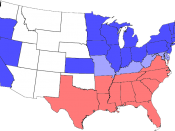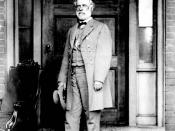The Civil War's economic impact benefited the Union, while devastating the Confederacy. However, both regions experienced labor shortages and price increases. As the regional feuding progressed, both of the sections came upon problems of disunity and sectional rebellion. Long-term gaps between social classes concurred from the grueling war. The war's intrusions upon everyday life also came about in both sections. Many families, living mainly in the South, were moved or dislocated and some were even destroyed.
The war affected the Union's economy unevenly, yet effectively. As southern markets were lost, their dependent agriculture and textile industries up North felt the kick and were greatly damaged as well. However, the aiding war effort industries, felt the opposite. With the war constantly demanding for more armory devices, clothes, etc., any industry that could fabricate the wanted products transformed into a booming industry within no time at all. The Railroading industry also became a booming business as military demands for transportation of troops, and supplies were introduced.
The destroying of the South's railroads intensified their strength greatly. This action, as well as the tariff court rulings, benefited the Union greatly by offering them a chance to fully create a transcontinental railroad located totally in the North instead of running between New Orleans and San Francisco.
Unlike the North, the Confederacy's economy was crushed by the impact of the war. There were a number of factors that thrust the South's industrial growth rate into a slump. The Northern forces destroyed their railroads, making southern travel very difficult and rare. Cotton production of the South depleted enormously as many of their crops were destroyed by the Union forces. This slashed the Confederacy's food/textile-developing regions into shreds. Nevertheless, the South's persistence in growing cotton, later on benefited them on sectional trading circumstances with...


